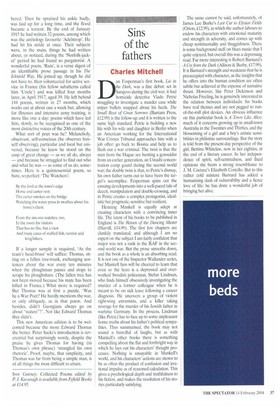Sins of the fathers
Charles Mitchell
Dan Fesperman's first book, Lie in the Dark, was a fine debut: set in Sarajevo during the civil war, it had homicide detective Vlado Petrie struggling to investigate a murder case while sniper bullets snapped about his heels. The Small Boat of Great Sorrows (Bantam Press, £12.99) is the follow-up and it is written to the same high standard. Petrie is building a new life with his wife and daughter in Berlin when an American working for the International War Crimes Tribunal approaches him with a job offer: go back to Bosnia and help us to flush out a war criminal. The twist is that the men from the Hague are hunting a genocidist from an earlier generation, an Ustashi concentration camp guard during the second world war; the double twist is that, to Petric's dismay, his own father turns out to have been the target's accomplice. Fesperrnan spins out the ensuing developments into a well-paced tale of deceit, manipulation and double-crossing, and in Petrie creates a complex protagonist, idealistic but pragmatic, sensitive but resilient.
Henning Mankell is equally adept at creating characters with a convincing inner life. The latest of his books to be published in England is The Return of the Dancing Master (Harvill, £1499). The first few chapters are clunkily translated, and although I am no expert on the subject I am fairly confident that major was not a rank in the RAF in the second world war. But the prose smooths down, and the book as a whole is an absorbing read. It is not one of the Inspector Wallander series, but Mankell fans will be cheered to learn that even so the hero is a depressed and overworked Swedish policeman, Stefan Lindman, who finds himself obsessively investigating the murder of a former colleague when he is meant to be on sick leave following a cancer diagnosis. He uncovers a group of violent right-wing extremists, and a killer taking revenge for the murder of his Jewish father in wartime Germany. In the process, Lindman (like Petrie) has to face up to some unpleasant home truths about his father's political sympathies. Thus summarised, the book may not sound a barrelful of laughs, but as with Mankell's other books there is something compelling about the flat and forthright way in which he lays out his characters' thought processes. Nothing is unsayable in Mankell's world, and his characters' actions are shown to be as often the product of confusion and irrational impulse as of reasoned calculation. This gives a psychological depth and truthfulness to his fiction, and makes the resolution of his stories particularly satisfying.
The same cannot be said, unfortunately, of James Lee Burke's Last Car to 4sian Fields (Orion, £12.99), in which the author labours to endow his characters with emotional maturity and strength in adversity, and comes up with cheap sentimentality and thuggishness. There is some background stuff on blues music that I quite enjoyed, but overall this was a depressing read. Far more interesting is Robert Bamard's A Oy from the Dark (Allison & Busby, £17.99). It is Barnard's strength and weakness that he is preoccupied with character, as the insights that he offers into the human condition are often subtle but achieved at the expense of narrative thrust. However, like Peter Dickinson and Nicholas Freeling, he is genuinely interested in the relation between individuals; his books have real themes and are not pegged to runof-the-mill plot devices. An obvious influence on this particular book is A Town Like Alice: much of it concerns growing up in small-town Australia in the Twenties and Thirties, and the blossoming of a girl and a boy's artistic sensibilities in philistine surroundings. But the story is told from the present-day perspective of the girl. Bettina Whitelaw, now in her eighties, at the end of a literary career. In her independence of spirit, self-centredness, and fixed opinions she bears a strong resemblance to J. M. Coetzee's Elizabeth Costello. But to this rather cold mixture Barnard has added a humanising dash of vulnerability and a fierce love of life: he has done a wonderful job of bringing her alive.


































































 Previous page
Previous page